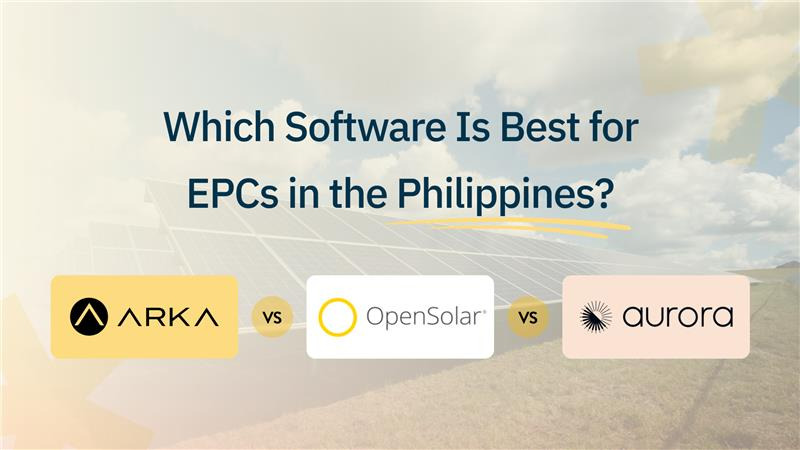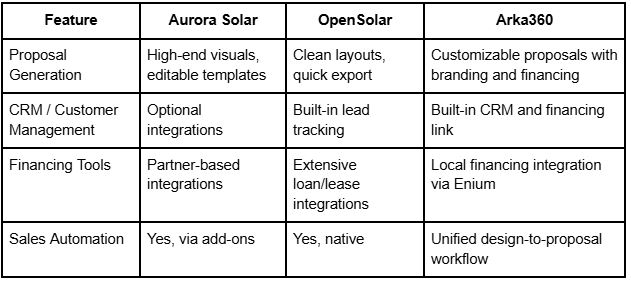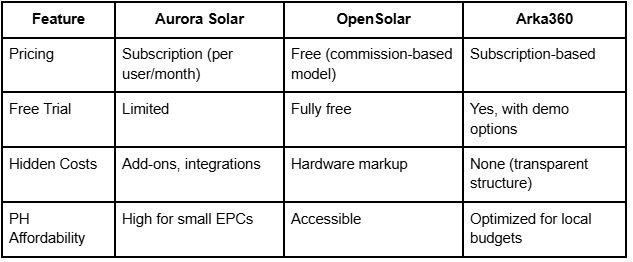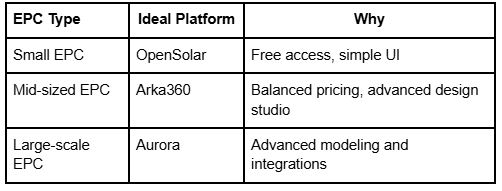
Every EPC in the Philippines faces a distinct mix of challenges — from inconsistent grid connections and evolving regulations to fluctuating import duties and project costs. In such a setting, the choice of solar design and proposal software can make or break operational efficiency.
Aurora, OpenSolar, and Arka360 each provide design and proposal tools, but their differences in localization, pricing, support, and integrations largely determine which platform truly fits the Philippine solar ecosystem.
In this comparison, we’ll look at how these three platforms stack up in terms of features, costs, local suitability, ROI, and overall performance — helping EPCs decide which delivers the most value for their workflows.
Before diving deep, let’s start with a quick overview of what each platform offers.
Aurora Solar is one of the oldest and most globally recognized solar design platforms. It’s known for advanced 3D modeling, shading simulations, and production estimates. EPCs use it to create precise solar layouts and energy yield projections for residential and commercial projects. Aurora’s AI-assisted design tools and satellite imagery integration make it ideal for complex sites — though it comes at a premium subscription cost.
OpenSolar is a free-to-use design and sales platform that combines proposal creation, financing options, and hardware marketplace integrations. It’s particularly attractive for small and mid-sized EPCs trying to minimize upfront costs. While the software offers strong automation and design capabilities, it primarily monetizes through partnerships with financing and hardware providers, making it different from traditional subscription tools.
Arka360 is an all-in-one solar design, proposal, and sales platform built for EPCs and installers, with a growing user base in the Philippines. Unlike global tools, it’s tailored for the unique regulatory and market conditions of Southeast Asia, offering end-to-end features — from AI-driven layouts to permit-ready proposals and integrated financing. It’s especially focused on local accuracy, customization, and scalability for teams operating in diverse regions of the Philippines.
You can also explore detailed comparisons like
Solar EPCs in the Philippines operate in a very different context compared to those in the U.S. or Europe. Software performance depends heavily on how well it adapts to local realities.
The Philippines follows a net metering system under the Renewable Energy Act, but interconnection and permitting processes vary by utility. Software that can customize design parameters based on local distribution utilities’ requirements provides a real edge.
While government incentives for solar projects exist, EPCs often deal with region-specific documentation and approval processes. Unlike standardized U.S. permitting systems, the Philippine model is fragmented, requiring flexible proposal and compliance modules.
Hardware costs fluctuate due to import duties and logistics. A localized software platform that can dynamically update component pricing and margins helps EPCs maintain accurate ROI projections.
Internet connectivity in rural or off-grid regions remains a challenge. EPC teams need software that can handle data caching or offline work modes without compromising performance.
Supporting responsiveness and training in local time zones is vital. Some international platforms, like OpenSolar provide dedicated local support still sets platforms apart.
In short, the Philippine solar landscape demands a solution that balances technical precision, cost efficiency, and local adaptability.
Let’s break down how Aurora, OpenSolar, and Arka360 compare across critical categories.

Aurora remains the strongest in technical modeling, but Arka360’s localization gives it a unique advantage for Philippine EPCs seeking region-specific accuracy.

While Aurora and OpenSolar offer great proposal tools, Arka360 stands out with its design-to-proposal integration and localized financing compatibility — a must for Philippine EPCs.

Aurora offers top-tier tools but at a steep cost. OpenSolar’s “free” tag is appealing, though commissions and hardware markups can add up. Arka360 provides a balanced pricing model designed for Philippine businesses.

For EPCs requiring on-ground or time-zone-aligned assistance, Arka360 provides a more accessible and responsive support framework in the Philippines.

For EPCs dealing with rural connectivity or large team collaboration, Arka360’s performance tuning and caching options offer tangible reliability gains.
Software choice directly impacts EPC efficiency and bottom-line ROI.
If an EPC handles 20 proposals per month:
For EPCs looking to calculate ROI more precisely, a mini PH-specific calculator widget can be integrated to estimate savings based on proposal volume, project value, and software licensing costs.
.png)
Transitioning to new software isn’t always plug-and-play — especially in a local context like the Philippines.
Aurora supports robust file imports (CAD, KMZ), but the regional mapping accuracy sometimes requires manual correction. Arka360 adapts to Philippine GIS datasets and local irradiance data, improving reliability for installers.
Aurora and OpenSolar rely on global standards. Arka360, on the other hand, incorporates local permit templates and tariff modules, saving EPCs hours during documentation.
Local EPCs often struggle with training access. Arka360’s on-ground or virtual onboarding sessions simplify adoption across teams.
Cloud-based software can lag in areas with poor internet coverage. Arka360 mitigates this by offering partial offline access and optimized sync functions.
Choosing the right platform depends on your priorities. Here’s a quick decision map:

For EPCs targeting Philippine-specific ROI and faster project approval cycles, Arka360 offers the most locally tuned value proposition.
1. Which software costs more overall in the Philippines?
Aurora Solar generally carries the highest subscription cost. OpenSolar is free but includes optional markups, while Arka360 offers localized pricing tailored for Philippine budgets.
2. Can OpenSolar’s “free” model work effectively in the Philippines?
Yes, but EPCs must consider hardware and financing partner dependencies that can indirectly affect margins.
4. Is Arka360 compliant with local regulations and permitting?
Yes. Arka360’s workflows include Philippine tariff and permit modules, improving compliance and reducing administrative time.
.png)
Each software brings something valuable to the table:
Ultimately, the best solar software for your EPC depends on your budget, project scale, and local compliance needs.
If you’re an EPC in the Philippines looking for an integrated platform that merges design, proposal, and regulation-ready documentation, Arka360 offers a locally tuned package built for your success.
Get started today with a demo and see how the right solar design software can transform your operations from design to proposal delivery — faster, smarter, and built for the Philippine market.













